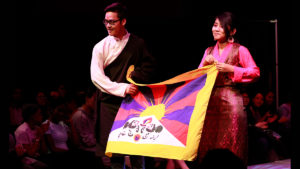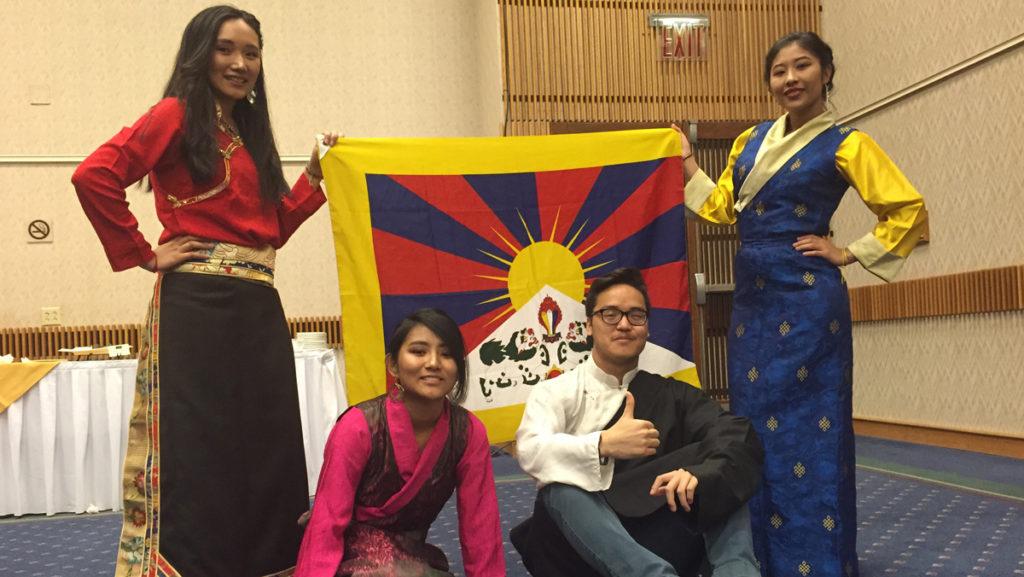Tibet sits on the lofty Tibetan Plateau, on the northern side of the Himalayan mountain range. It shares Mount Everest with Nepal and is home to the Yarlung Tsangpo Grand Canyon, one of the deepest and largest canyons in the world. But its beauty masks the more tumultuous events of its past and present.
“There is self-immolation happening in Tibet, and a lot of people don’t know about it,” said junior Tsering Lama, event manager for IC Unity Tibet. “There is a lot of pressure on the press. No photos, no videos. Nothing is being released, and people are being tortured over freedom of religion and freedom of speech.”
Unity Tibet started Spring 2017 and was founded with the goal of spreading awareness and education about events happening in Tibet.
Tibet was invaded by the People’s Republic of China in 1950 and has been under Chinese occupation since. It is illegal to fly a Tibetan flag, all political activity outside the Chinese Communist Party is illegal and Chinese authorities tightly restrict Tibetan news media, according to Freedom House, an independent watchdog organization. This July, UNESCO approved China’s request for special recognition for a vast, traditionally Tibetan region known as Hoh Xil or Kekexili, which is a part of the high-altitude plateau in Qinghai Province roamed by nomads. The International Campaign for Tibet, an advocacy group for the freedom of Tibetans, argues this “special recognition” will allow China resettle tens of thousands of these nomads and upset the ecosystem.
Junior Tashi Choezom, the club’s vice president of communication, said she and her fellow club members noticed a lack of diversity upon coming to Ithaca. So they started the club to connect and collaborate with other clubs promoting similar messages as well as to spread awareness of conditions in Tibet.

The club has previously collaborated with the International Club, Choezom said, and wants to work with the Ithaca College Asian American Alliance. Unity Tibet participated in the International Club’s International Week One World Concert and Interfashional events. The club’s main focus, however, remains promoting education about what is going on in Tibet and spreading awareness. Choezom said Tibet does not receive coverage in international news and that many people are unaware of the conditions Tibetans face.
Choezom was born in Tibet and raised there until she was 9. She said one of the major issues facing Tibet is a lack of education, since the Chinese government controls Tibet’s information flow.
“When I was back there, I never went to school,” she said. “The first time I went to school in the United States, I started in 6th grade, and it was hard for me to catch up.”
While she was still in Tibet, Choezom said, she had no idea her country was occupied by China or that her country’s religious leaders were living in India as refugees. When she started learning Tibet’s true history, she said, she felt outraged.
“I was like, ‘Oh damn, it’s really like this?’” she said. “Why didn’t my grandparents and my parents tell me? Why didn’t they tell me we have our own flag and our own country? I need to speak up, and I need to talk to people about what is happening … so that the people around me receive the real education.”
Lama, who grew up in Nepal, said she was more connected to Nepalese culture, but when she was 10 or 11, she went to go see the Dalai Lama make a speech in India. Soon after, she started to realize how much the Dalai Lama did on behalf of Tibet. After that, she started to become more interested in Tibetan culture and its continued existence.
“Preserving it was something I felt had become a part of my life’s goal,” she said.
Senior Ngawang Chime, the club’s president, said her goal for the club is to preserve Tibetan culture for posterity and let the outside world know what is happening because reporters in Tibet are silenced.
Lama compared living in Tibet to living in a cage because, she said, Tibetans are only fed the information that the Chinese government wants them to know.
“Each and every human being has the right … to freedom of speech, freedom of religion, freedom of expression,” she said. “Tibetans should receive those kind of rights.”
Choezom said she feels a personal responsibility to raise awareness about Tibet because she was fortunate enough to come to the United States and have access to rights her parents didn’t have.
“Our parents didn’t get an education, … but they still gave us hope and raised us and let us go to school,” Choezom said. “They gave us the hope, so we’re taking their hope and this opportunity to let the world know what is going on. And there are so many people the same age as us or younger than us in Tibet and not getting the same opportunity, so we want to stand up for them since we are getting the chance.”
Lama said the club does something a little different each meeting and said the club always encourage new faces. For example, Lama said, some meetings focused on teaching Tibetan culture, history or customs, while at other meetings, Lama and other e-board members introduced new members to Tibetan food and music.
The club members do not want to appear as if they are bringing a political view to the college, Choezom said, but are rather aiming to educate.
“We aren’t targeting Chinese people,” Choezom said. “I lived in Tibet, and I know even the Chinese have similar lives to us. They don’t have freedom of speech either.”
For the upcoming semester, Chime said, she wants to connect and collaborate with the Tibet Initiative at Cornell, which shares Unity Tibet’s goal of promoting student awareness about Tibet. She also wants to bring more students into leadership roles.
“One of our goals is to show a Tibetan movie this year, ” she said. “We also want to bring people to the Tibetan monastery. There’s a Tibetan monastery next to the college, and we want to show people the statues and all the other stuff around the monastery.”
Other goals for the club include improving upon meetings by doing a better job explaining Tibetan culture and retaining members.
“We did pretty good last semester … but we didn’t do a good job on the first day, and people were confused about Tibetan history,” Chime said.














